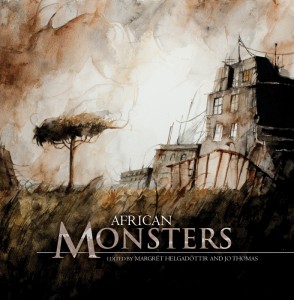New thing for 2018, now that it is properly underway. Sunday’s we are going to give you just a few paragraphs from a story to enjoy. There is no particular order to these, but we hope you enjoy them during the year.

From ‘That Woman’ By S. Lotz
Published in African Monsters
It took me almost eight hours to drive from Accra to the Northern District, and by the time I pulled up outside the police station, back aching from the punishment doled out by the potholes that plagued the roads, all I wanted was a cold drink and a soft bed. No chance of that—I only had two days to conclude my business here. A month earlier, my superior had received a flurry of furious letters from a Gushengu resident complaining that the local police were refusing to look into the suspicious deaths of several men from the district, and that he and his son were now “under attack”. The letters were garbled and borderline illiterate, but they were persistent. Considering the other priorities we had at the time, it was an unusual errand, but my boss was newly appointed, and was wary of giving his detractors any cause to accuse him of incompetence. I was instructed to investigate the man’s claims.
The police station was understaffed, but eventually a constable in a crushed shirt showed me into the district police commander’s office. The commander, a large middle-aged woman with a flat face, greeted me politely and waved me into the seat in front of her desk. I knew little about her; just that she’d been there for many years, working her way up the ladder despite the many difficulties she must have faced as a woman in a male-dominated profession. I don’t consider myself an unconfident man, but I found myself sweating under her gaze: she had unusual, light-coloured eyes that were hard to read and gave her a predatory air. Shrugging off my discomfort, I explained that I was an investigator from the Deputy Inspector’s office in Accra and outlined the reason behind my errand.
She listened without showing any emotion. ‘And who is the man who sent these letters?’
‘A Mr Kwame Nfani.’
‘I know of him. He has been here many times.’ She gave me a bland smile, no hint of guilt that she’d been neglecting her duties. ‘And he says that a great injustice has been done, eh?’
‘He says that a man from his village and four others in neighbouring villages have died in suspicious circumstances, and he believes his son will be next to die.’
‘And how did he say these men died?’
‘He did not.’
‘So on this basis—hearsay—you are conducting an investigation?’
What to say to that? She was correct. She let me squirm for a while, then leaned back in her chair. ‘Ask your questions.’
‘Was there an investigation into the deaths?’
‘No. There was no need. There have been no suspicious deaths in the region recently. But I know of what you speak. In the cases of the men Mr Nfani is referring to, the doctor said three of them were due to malaria, and two succumbed to meningitis. As you know, there was an outbreak of meningitis in the region at the time.’

